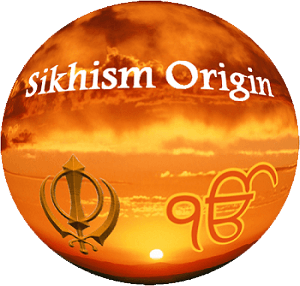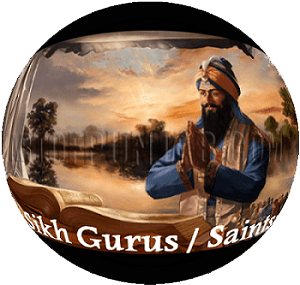- Sikh Saints -
Bhai Mardana (1459 to 1520)
Bhai Mardana was the lifelong companion and first disciple of Guru Nanak. Bhai Mardana was born in 1459 at Nankana Sahib to Muslim parents Bhai Badre and Mai Lakho. He belonged to a caste of musicians which sang and danced at festivals and weddings. Bhai Mardana became friends with Guru Nanak when they were both children, Mardana being 10 years older than Guru Nanak.
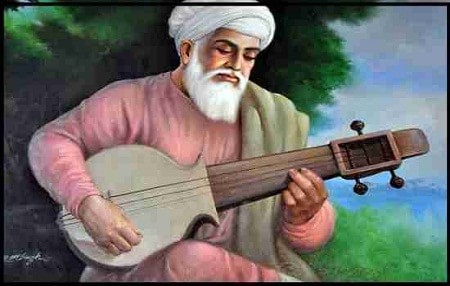
Bhai Mardana accompanied Guru Nanak on most of his great journeys, he would play the rebeck (a string instrument) while Guru Nanak would be singing and composing his hymns. Three of Bhai Mardana's hymns are included in the Guru Granth Sahib. Bhai Mardana passed away in 1520 on the banks of the river Khuram in Afghanastan. He was returning with Guru Nanak on the Gurus fourth and last great journey to Mecca and Medina. Guru Nanak personally performed the last rites of Bhai Mardana. Bhai Mardana is considered the founder of the musical tradition of the Sikhs.
Baba Buddha (1506 to 1631)
Baba Buddha was the great Sikh saint who had the pleasure of serving under the first six Gurus. Baba Buddha was born in 1506 in the village of Kathu Nangal. When he was a young boy herding cattle in the fields when he met Guru Nanak who was visiting the village. The boy served the Guru milk and Guru Nanak exclaimed that though young in age, he was a Buddha (old man) in terms of his understanding and wisdom. Baba Buddha converted to the path of Sikhism and became an exemplary disciple of the Gurus.
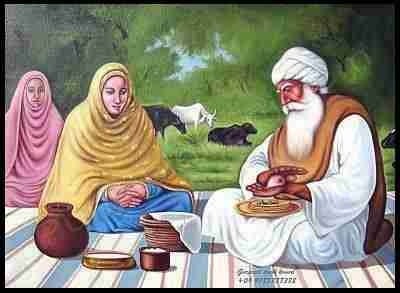
Baba Buddha was responsible for the guruship ceremony of the next five Gurus from Guru Angad to Guru Hargobind. Under Guru Arjan Dev, Baba Buddha was appointed the first custodian (granthi) of the Guru Granth Sahib in the Golden Temple in 1604. Baba Buddha was also responsible for the early education of Guru Hargobind as a child and helped to personally construct the Akal Takht. Baba Buddha passed away in 1631 at village Ramdas and had his last rites personally performed by Guru Hargobind.
Bhai Gurdas (1560 to 1629)
Bhai Gurdas was a great Sikh scholar who was the scribe of the original copy of the Guru Granth Sahib under the guidance of Guru Arjan Dev. Bhai Gurdas was born around 1560 at Goindwal and was the son of Datar Chand, the younger brother of Guru Amar Das. Bhai Gurdas learned Sikhism from his uncle Guru Amar Das and upon the Gurus death was sent by Guru Ram Das as a missionary to preach Sikhism at Agra. Under the guidance of Guru Arjan Dev, Bhai Gurdas spent a year with the Guru at Armitsar and helped to scribe the original copy of the Guru Granth Sahib. Bhai Gurdas also met the mughal emperor Akbar and convinced him that the Guru Granth Sahib was not derogatory to Islam. Bhai Gurdas was also a great writer and provides the best information that we have about the early days of Sikhism. He composes 40 vars (ballads) and 556 kabits (couplets) which Guru Arjan blessed as being "the key to the Guru Granth Sahib".
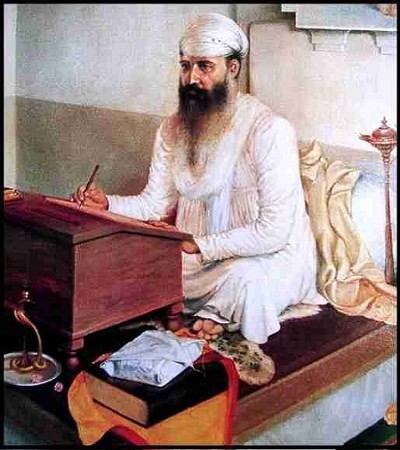
Out of his humility Bhai Gurdas did not have any of his compositions included in the Guru Granth Sahib, but they are part of the writings outside the Guru Granth Sahib that are approved for recital by Sikhs. While Guru Hargobind was imprisoned at Gwalior Fort, Bhai Gurdas along with Baba Buddha were in charge of running the affairs of the Sikh community. Bhai Gurdas also helped to construct the Akal Takht. Bhai Gurdas died in 1629 at Goindwal and had his last rites personally performed by Guru Hargobind.
Bhai Nand Lal (1633 to 1715)
Bhai Nand Lal was a great poet and close associate of Guru Gobind Singh. Bhai Nand Lal was born in 1633 at Ghazni where his father was a high government official. Bhai Nand Lal became an accomplished poet and was fluent in Persian and Arabic. He married a Sikh girl and eventually became a disciple of Guru Gobind Singh. He lived in close association with the Guru from 1697 onwards. Bhai Nand Lal personally accompanied Guru Gobind Singh to Deccan where the Guru was assassinated. Bhai Nand Lal produced a
number of works about the teaching of Guru Gobind Singh and the code of conduct he laid down. The works of Bhai Nand Lal are given equal respect as those of Bhai Gurdas and are read in gurdwaras.
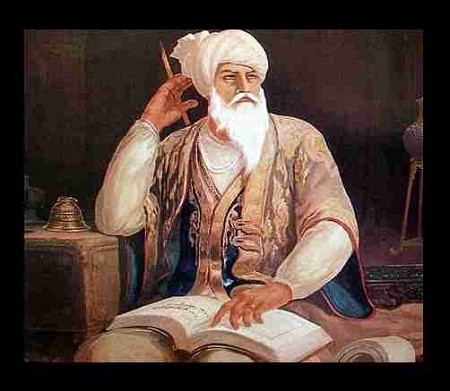
Bhai Mani Singh (1670 to 1737)
Bhai Mani Singh was a great Sikh scholar and martyr who was the scribe of the final version of the Guru Granth Sahib under the guidance of Guru Gobind Singh and who compiled the Dasam Granth following the death of Guru Gobind Singh. Bhai Mani Singh was born to Jat parents at the village of Sunam in 1670. He was the younger brother of Bhai Dyala who was martyred along with Guru Tegh Bahadur in 1675. Bhai Mani Singh was raised from a young age with Guru Gobind Singh by the Gurus mother Mata Gujri. Bhai Mani Singh became a great preacher of Sikhism and spent almost a year with Guru Gobind Singh at Damdama Sahib compiling the final and current version of the Guru Granth Sahib in 1705. After the death of Guru Gobind Singh, Bhai Mani Singh was installed as the head granthi at the Golden Temple in 1721. Here he produced many works on Sikhism and under the insistence of Guru Gobind Singhs widow Mata Sundri compiled the works of Guru Gobind Singh and produced the Dasam Granth.
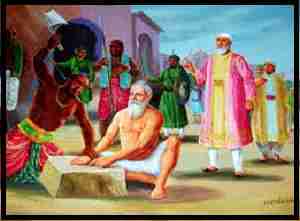
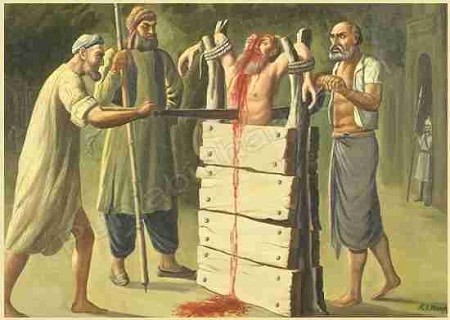
In 1737 Bhai Mani Singh took permission from the muslim governor of Lahore for the Sikhs to celebrate Diwali at the Golden Temple on the payment of Rs. 5,000 as tax, a practice which had been banned. Not enough people attended Diwali that year because they were afraid of the muslim authorities and as a result not enough money was collected. The muslim authorities arrested Bhai Mani Singh and publicly executed him in Lahore.

